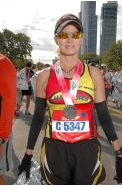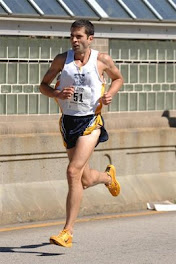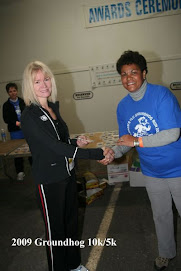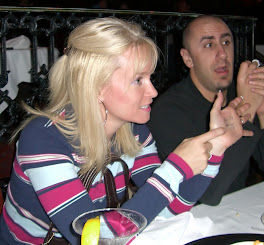 “This time it was worth the pain. I had a marathon medal to bite down on. And something of far greater value—the sure knowledge of friends there for me in both loss and victory, with whom to share the miles and trials of life.” –Bill Harkins, Second Wind.
“This time it was worth the pain. I had a marathon medal to bite down on. And something of far greater value—the sure knowledge of friends there for me in both loss and victory, with whom to share the miles and trials of life.” –Bill Harkins, Second Wind.Bill Harkins’ pursuits are widely varied: rodeo competitor (where he met his wife, Eileen), construction project manager, accomplished professional musician, part-time writer, marathoner, and running coach. Now 72, he began running late in life and wrote a book on the subject in 1996, entitled Second Wind. Not to be found anywhere, this story is worthy of another printing.
Though I’ve known Bill for a few years, I stopped all efforts in learning more about him until I’d completed a careful reading. Full of irreverent charm and life wisdom, he tells the story of how he evolved from the “couch of doom” (to use a Steve Runner term) and life-threatening heart troubles into a vitally healthy and physically fit runner, inspiring and mentoring many others along the way.
He knew he was making unhealthy choices, and his health was deteriorating. But, “Making things worse is easier by far than making them better.” He soon found himself unconscious on the floor, an alarmed Eileen standing over him. At thirty pounds overweight, he described his 5’ 7” frame, “My stomach looked as if I’d swallowed a basketball.”
Two years into his running journey he peered at his metamorphosed shape, “The image in the mirror now looked trim and fit… Yes, there was a little thrill in looking at myself. I did look great. And I knew better than anyone else how hard I’d worked to accomplish that.”
It’s a story of struggle as he lost his job, and a story of heartbreak as he lost his son, Bill. With more than one defeat along the way, he ultimately triumphs and joyfully crosses the finish of his first marathon. To read it dry-eyed to the end would be to remain untouched by an incredibly moving story.
In addition to Second Wind, he formerly wrote about running for Master Pieces Magazine in
What particularly touches me is how Bill has such a heart for those around him. Self-defined as “ornery,” those who run with him regularly see the genuine teddy-bear heart in spite of his protests to the contrary.
Debbie Canfield, a regular in our running club and Bill’s weekly biking partner during the warm months had this to say about Bill:
“He is an amazing person. One of the things that I appreciate is his dry wit and his quick response one-liners. I believe one of his gifts is that of mentoring. He truly cares about his friends and fellow runners and does whatever he can to coach and encourage them. He loves to eat out at "nice" restaurants and has closed down many jazz bars. Most of the local jazz folks know him by name. He is crazy about his granddaughter, Emily, who was born in
Verna Troutman, his “editor and sounding board” for much of his writing and dear friend of Bills had this to say. (And if you haven’t already, please read the entry on Verna a few weeks back. Her story was my inaugural entry for “Cool Runners I Know.”):
“After discovering he had a passion for running he pursued further education to get some qualifications for teaching and coaching. I know he has an Associates Degree in some exercise category, I think having to do with the physically impaired. At least, I know he did his internship with impaired kids. He also went to the Cooper Institute in
Alex: Bill, I really enjoyed your book and learning more about you and your running. What would you consider your greatest running achievement?
Bill: I was never fast, and I often crashed in marathons due to calf cramps. Maybe the big achievement was running
One thing I achieved was the knowledge of how running works and should be done. Now, if you ask me what I am most proud of—and grateful for—in my running life, it is having been able to pass that knowledge to others who were able to use it to achieve far better performances than I ever could.
B: Too few, and too many. I ran in five marathons, and crashed and burned in two of them. My calves locked up solid in my first marathon, at
A: You’ve been such an inspiration to so many people, from great to small. Who has been your greatest running mentor?
B: There were two. David Virtue taught me the science and mechanics of running. Verna Troutman taught me to love running. Mentoring isn’t teaching, it’s enabling by example and encouragement. Verna and I fed off each other in the early years of our running, sharing what we each learned, encouraging each other and helping each other with training plans. We laughed about who coached whom, but looking at what Verna has accomplished in running, it’s pretty clear who was the one with more talent and knowledge. Perhaps more important was Verna’s mentoring in areas of life away from running. There were a lot of philosophical discussions in the long miles (aren’t there always?) and Verna made me think—and re-think—many things in my life.
A: Everyone, Verna included, has mentioned your time at The Cooper Institute. Can you talk about that a little bit?
B:
My class began at the institute on November 12th, 2001. That morning, with the horrors of 9/11 still fresh in everyone’s mind, we heard the news that another airliner had just crashed into a crowded part of
The Cooper Institute is the largest aerobics research center in the world, with a massive library of books and materials on the subject, all of which are available to the students both while there and, later, online, along with anytime consultations with former instructors.
The things I learned at The Cooper Institute became a large part of what I tried to teach to the students in my running classes and the individuals I coached.
A: Clearly, your time at Cooper formed a lot of your ideals for running. What is your coaching philosophy?
B: Never thought about it as such. I tried to coach by doing it with the students. I believe things like nutrition, injury prevention, hydration, body mechanics, etc. are learned in a classroom setting, but running is learned on the track and the roads, in company with experienced—and knowledgeable—runners. That’s why I ran with the classes, and invited former students and veteran runners to run with them, too.
A: A lot of us view you as sort of the grandfather of the Little Blue Indians. I know I’ve been running with you guys for a little over two years now. Did you start the LBI running club?
B: No. I can’t and don’t take any credit for that. The group was started by a handful of former students from one of the running classes who wanted to keep running together after the class ended. I recall that Becky O’Connor and Susanne Reed were the ringleaders, and I think some others involved were Jeannie McCoy, Pat Stevens, Andrea Melanson. If I got some names wrong, or missed some, forgive me. The group was up and running strong before I was fully aware of it.
So, the students started it on their own, and were kind enough to let me join them and bring students from following classes to the trail to run with them on Saturdays. It became an additional training venue for the classes—a very important one when the classes began training for longer distances. Many students then stayed with the group for the Saturday runs when their classes ended.
The beauty of the
A: Of the hundred or more students in your classes, how many do you think are still running?
B: Again there’s no way to know for certain. I’d occasionally see a student at a race, years after they were in a class. Sometimes they’d spot me and remind me who they were and what class they were in. They were usually passing me, and ran off and left me after the brief amenities.
Last year, someone I helped in an individual session called me up—after five years—to say they are still out there, still running regularly on their own, and just wanted me to know it. It gives you goose bumps when things like that happen.
A: What advice would I give to someone starting to run later in life?
B: Start earlier, so you can enjoy the fun longer. Seriously? Start earlier…..
Okay. The old adage about it never being too late, is an old adage for a reason; it’s true. The human body is a remarkable instrument. If asked nicely, in the right way, it can and will respond to training with amazing results. Studies conducted in nursing homes proved that people in their eighties and nineties, when given the opportunity to perform mild exercise improved in areas such as balance, lung capacity, dynamic and absolute strength.
I know everyone is told to consult their doctor before starting an exercise regimen, especially running. At the risk of being labeled a heretic or a danger to old folks, I think we have to take that with a grain of salt. Some doctors really don’t understand what recreational running is, or how it can be started and continued safely, so they take the safe way out and disparage it for older adults. We lost a potential runner one year because a doctor just “put his foot down and said no.” That person was in good health, had no medical conditions that would prevent running. But the doctor said they were too old to start. I hate that. These are our bodies, and we know them better than anyone else. And not every doctor is knowledgeable about exercise. We had another runner begin then stop because a doctor told her running was the worst thing anyone could do and if he ever saw her running he’d know she was really stupid. No kidding, she quoted him to me just that way. And she was proud of herself for taking his advice, adding, “and he’s a sports doctor for the Chiefs.” I asked her to ask him if he ever tried telling that to Marcus Allen. But she was convinced, and never ran with us again.
It’s never too late to do whatever you can.
B: Jeff Galloway wrote the bible for beginning runners and those moving up from the beginning stages. It’s called
Lore Of Running, by Tim Noakes, is a great reference book for any serious runner. It has been updated through the years as new knowledge has been obtained.
While not a running book, per se, Covert Bailey’s Smart Exercise is a good primer on exercise physiology in layman’s terms.
Probably the book that impacted me most is John L. Parker’s Once A Runner. It’s fiction, a story about a college miler and his trials and tribulations seeking to break four minutes. It’s a pretty good insight into the mind and heart of a runner. It’s a short book, and I often took it from the shelf and re-read it, in whole or part, before races. If you are looking for “the secret” to running, it is revealed in this book.
In closing, I wanted to share that along the path I took to really learn “who Bill is,” I discovered that Bill and I share many things in common. Some great—a frightening health “wake-up call” that spawned our passion for fitness, a past as a musician and a running career that started late in life—but some not so great. We both buried a child. And I leave you with a deeply moving quote from Bill to me that perhaps reveals just a little bit more about whom we both are.
Run long, Bill, My friend.














_s_jpg.jpg)









No comments:
Post a Comment